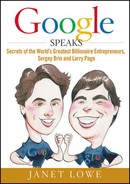5.10. TWO WAYS TO ADVERTISE: ADWORDS AND ADSENSE
Google's advertising program has two distinct segments: AdWords, for those wishing to advertise a product or service, and AdSense, for websites wishing to get paid for displaying ads.
Launched in 2000, AdWords is Google's flagship advertising product and primary source of revenue. The pay-per-click advertising includes text and banner ads. In the beginning, advertisers paid a set monthly fee for Google to set up and manage their campaigns. AdWords soon became something quite different—a self-service portal, a do-it-yourself tool that helped myriad small businesses get noticed.
In this second-generation service, advertisers bid both on words that should deliver their ads and on the maximum amount they are willing to pay per click. While the process is shrouded in mystery, one feature clearly appeals to advertisers. Google uses a Vickery auction system, in which winning bidders pay only one cent more than second-place bidders. This gives advertisers the courage to bid high, knowing that they will not be penalized if they are far above the market.
When a user Googles the bid-upon word, ads, also called creatives by Google, are shown as "sponsored links" at the top or on the right side of the screen. If the ad is appealing enough to inspire a searcher to click on it, the advertiser pays Google for every click.
The bid price helps get ads top placement on websites, but that is not the only factor. The ad can achieve top listing only if it appeals to enough Web surfers. The ad is assigned a "quality score." The quality score is calculated by historical click-through rates, relevance of an advertiser's ad text and keywords, an advertiser's account history, and other factors Google finds relevant. The quality score also has been used by Google to set the minimum bids for an advertiser's keywords. The minimum bid was meant to filter out low-quality ads, although there are reports that Google soon will drop the minimum bid.
"We literally buy millions of search terms," said Betsy Lazar, an advertising executive at General Motors, the nation's fourth largest advertiser. For example, "Chevy Detroit, Chevy, fuel-efficient vehicles."[]
Suitcase designer Heys International built much of its business on Web advertising and has been highly successful, thanks to Google. "It's helped a lot of young innovative companies like ourselves get worldwide attention that we couldn't have gotten if it was [not] for search engines like Google," explained Heys founder, Emran Sheikh.[]
Alice Bowe, a British garden designer, pays Google so that when anyone within 50 miles of her business types in "garden design," her site shows up. "I knew nothing about computers, or any of that sort of thing," she explained. "But it's really easy. You can type in as many different versions of the ad, and it will automatically try them out, then show the ones that do best more often."[]
Google's Tim Armstrong points out, "We have customers that manage their individual ad campaigns every day, multiple times a day and improve them every day, multiple times a day."[]
Beyond that basic service, Google then extended the ad-link concept so that websites automatically display ads linked to their text. AdSense technology can instantly analyze the text of any site and deliver relevant advertising.
Web-site owners use the AdSense program to earn money from text, image, and more recently, video advertisements on their websites. For many websites, AdSense is their main source of financial support. The advertisements are administered by Google and generate revenue on either a per-click or per-impression basis. The program has been a godsend for small websites that don't have the resources for hiring a sales staff and developing advertising sales programs.
A companion to the regular AdSense program, AdSense for Search allows the placement of the Google search box on websites. When a user searches the Internet or a website using the search box, Google shares any advertising revenue it makes from those searches with the website owner. However, the publisher is paid only if the searcher clicks on an ad on his page.
Google's advertising system is popular, but it isn't perfect. Click fraud has become a common practice, a subject that is explored in sections ahead.
AdWords has come under fire for allowing dvertisers to bid on trademarked keywords. In 2004, Google started allowing advertisers to bid on a wide variety of search terms in the United States and Canada, including the trademarks of their competitors, and in May 2008 expanded this policy to the United Kingdom and Ireland. Advertisers are restricted from using other companies' trademarks in their advertisement text if the trademark has been registered with Google's Advertising Legal Support team. Google requires certification to run regulated keywords, such as those related to pharmaceuticals, and some keywords, such as those related to gambling and hacking, are not allowed at all. These restrictions may vary by location.
Since June 2007, Google has banned AdWords' ads for student essay writing services, a move welcomed by university professors.
